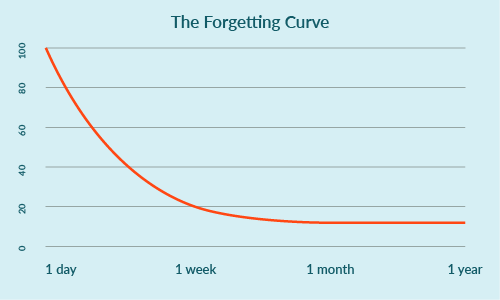Xerox did a study that revealed a whopping 87% of sales training is forgotten in just 30 days.
When you consider the hefty price tag of training, that’s a lot of wasted spend.
But it’s not by fault of the reps being bad learners or not studying–It’s neuroscience!

Think of your brain like a computer: it has RAM, your short term memory, and a hard drive, your long term memory. Every day, our brains take in more than 400 BILLION bits of information.
In order for that data to be moved from your short term memory to your long term memory, you need one ingredient: SLEEP.
It turns out that as we sleep, our brains are building and strengthening the neural connections that store the information you took in that day. At the same time, some connections are pruned, removing that information from your brain.
Sleep isn’t the only answer to remembering your new sales methodology. What most training programs lack is repetition.
Consider this: During training, information is slung at the team all day long. They sleep, their brain cherry-picks what to build neural connections for, and a percentage of it never makes it to their long term memory.
The next day, it’s another onslaught of new information, with very little review of the most important information shared on day 1.
So how do you get the reps to retain more from training and onboarding?
Achieving Rep Mastery
By building habits + triggering memory reactivation which leads to rep mastery. Here’s what the process looks like:
- Learn something new
- Apply what you learned in context on a real call
- Get feedback such as peer or manager coaching, or use the prospect’s reaction
- Get some sleep
- Repeat steps 2-5 several times
- Achieve mastery of what you learned
Every time you apply what you’ve learned on a different day, you’re utilizing memory reactivation which helps strengthen and grow those neural connections.

Think back to when you learned how to ride a bike. You watched someone to gain an initial understanding, then you hopped on and gave it a try.
There were probably some falls and scrapes in between, but after a few days or weeks with lots of sleep in between, you got better and it eventually became second nature.
The same process helps you get better on calls.
You learn something, such as how to ask better discovery questions that get prospects really talking.
That same day you do a call where you ask the discovery questions you always would have and then a few more that you typically would not have asked.
The prospect is impressed by your understanding of their business better than your competitors. This is positive feedback for your brain.
You also ask for feedback from your manager because you fumbled a bit during that part of the call.
They provide feedback and you sleep on it.
The next day, you try again and do it better this time.
A few weeks down the line, you have deep discovery questions mastered. Asking these questions is now a habit.
Scalable Consistency
One of the biggest challenges revenue leaders face is creating consistency across their teams. How do you make training stick when start classes have 5, 10, or even 30 reps?
You must take a multi-pronged approach.
- Reps should receive individualized coaching from their manager and trainers to help reinforce and develop the skills taught in training.
- Reps should be studying from a library of the best calls, listening to how top reps execute key skills.
- The team should also be returning to the classroom at regular intervals. Reps who are ramping up in their role should be brought back in at 30/60/90 days to review the core competencies to be successful at your organization.
- Certification needs to happen when trainers and managers observe the new reps doing the skill correctly on real calls.
Tenured reps still need classroom time, too. Make sure you’re bringing them in to review the basics AT LEAST once per quarter. They’ll also benefit from 201-level training where you help them expand upon their skills and selling style.
Life Hacks for Reinforcing Training + Coaching
Here is another tool for your arsenal in the fight against the Forgetting Curve:
Habit loops.
A habit loop is a pattern of behavior where a trigger or cue sets off an action, which then has a specific outcome (reward or punishment).
Think about what happens when someone around you sneezes.
Do you automatically say ‘bless you’ or ‘gesundheit’?
That’s a habit loop.
The sound of a sneeze is the trigger or cue, the habit is your response, and you’re ‘rewarded’ by being thanked.
Habit loops can be formed for positive or negative behaviors on sales calls. A negative habit loop can help reps break their reliance on filler words.
Here are a few habit loops to help your sales team build good behaviors:
Every time the rep hits their goal for the month, they purchase themselves something they highly desire such as a new pair of shoes.
Anytime a rep closes a deal, they hit your sales gong.
When a rep uses a specific filler word or phrase such as ‘awesome’ or ‘yeah, totally’ they put a quarter in the filler word jar.
If a rep fails to update the CRM, they do 10 reps of their preferred exercise (pushups, squats, jumping jacks, etc).
These are just a few ideas of habit loops that reinforce behavior but use your imagination and make sure they fit your sales culture. Get the reps to create their own habit loops, and they’ll be rockstars in no time.
So there you have it. An effective way to tackle the beast known as the Forgetting Curve.


